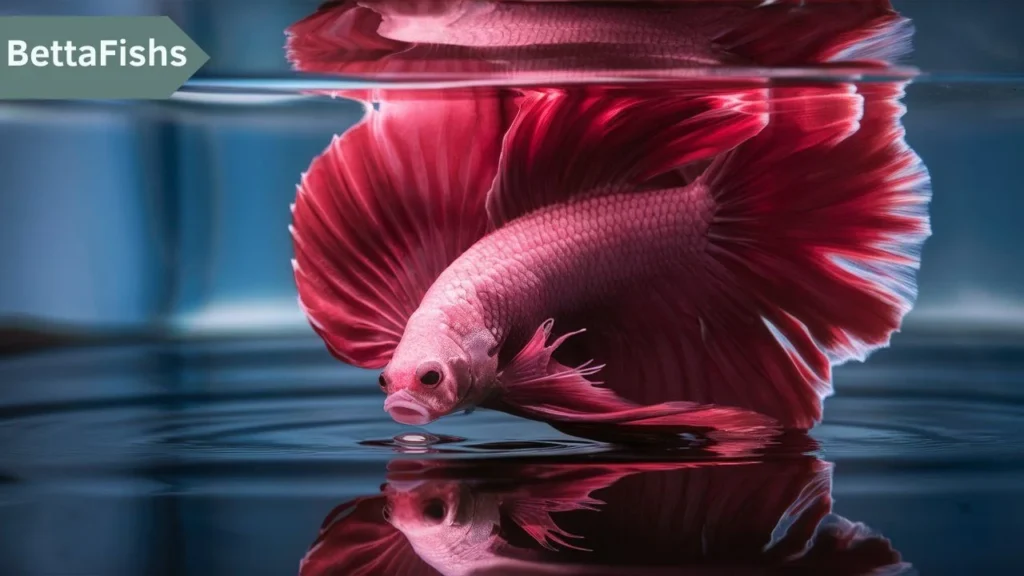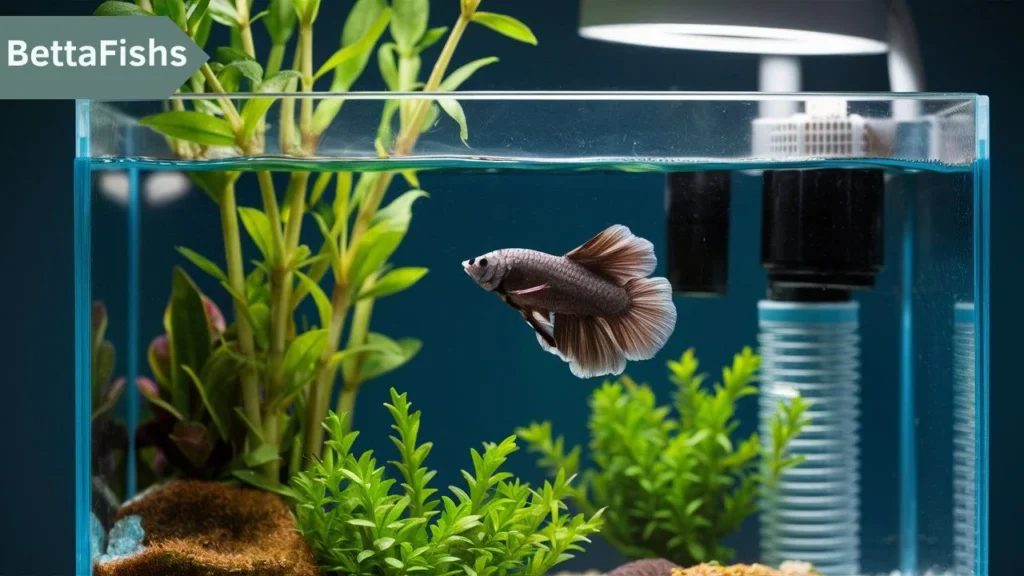Betta fish, scientifically known as Betta splendens, are among the most recognizable freshwater fish in the world. Originating from Southeast Asia, particularly Thailand, these fish are also commonly referred to as Siamese fighting fish. Betta fish have earned their place in aquariums worldwide due to their striking appearance and relatively easy care requirements.
But beyond their beauty, Betta fish are equipped with a unique adaptation that allows them to thrive in environments where other fish might struggle. This adaptation is their ability to breathe air, a trait that has evolved over time to help them survive in oxygen-poor waters. In this article, we cover “Can Betta fish breathe air?” in detail.
The Labyrinth Organ: A Marvel of Nature
What Is the Labyrinth Organ?
The labyrinth organ is a specialized structure found in Betta fish and some other species of fish. This organ allows them to breathe air directly from the atmosphere, supplementing the oxygen they obtain from water through their gills. The labyrinth organ is a complex, maze-like structure located above the gills, lined with thin plates of tissue that absorb oxygen.
The Evolutionary Advantage of Air Breathing
The development of the labyrinth organ is a fascinating example of evolutionary adaptation. In the wild, Betta fish often inhabit shallow, stagnant bodies of water such as rice paddies, ponds, and slow-moving streams. These environments can have low levels of dissolved oxygen, especially during the hot, dry seasons. The ability to gulp air from the surface provides Betta fish with a critical survival advantage in these challenging conditions.
How Do Betta Fish Breathe Air?
The Role of the Labyrinth Organ
When Betta fish come to the water’s surface and take a gulp of air, they are making use of their labyrinth organ. The oxygen absorbed by this organ is then transferred to the bloodstream, providing the fish with an additional source of oxygen. This is particularly important in environments where the water’s oxygen levels are insufficient to meet their needs.
Gills vs. Labyrinth: A Dual Breathing System
Betta fish are equipped with both gills and a labyrinth organ, giving them a dual breathing system. The gills function as the primary means of extracting oxygen from water, just like in other fish. However, when oxygen levels in the water are low, Betta fish can rely on their labyrinth organ to breathe air directly. This dual system is a significant reason why Betta fish are so resilient in varying water conditions.

Why Do Betta Fish Need to Breathe Air?
Oxygen Levels in Water
In their natural habitats, Betta fish often encounter conditions where the water is warm, slow-moving, or stagnant. Such environments tend to have lower levels of dissolved oxygen, which can be a limiting factor for the survival of many aquatic species. However, the labyrinth organ allows Betta fish to supplement their oxygen intake by breathing air, enabling them to thrive even in less-than-ideal conditions.
Adaptation to Shallow, Stagnant Waters
Betta fish have adapted to living in environments that are often shallow and filled with vegetation. These waters can become oxygen-depleted, especially during periods of high temperatures or low water flow. The ability to breathe air ensures that Betta fish can survive in these conditions, where other fish might perish.
The Importance of Surface Access in Betta Tanks
Ensuring Proper Tank Setup
For Betta fish kept in captivity, it’s crucial to ensure they have access to the water’s surface. This allows them to breathe air as needed, mimicking their natural behavior. Tank setups should be designed with this in mind, avoiding any decorations or covers that might obstruct the surface.
Common Mistakes in Betta Fish Care
A common mistake among Betta fish owners is keeping the water level too high or using tank covers that prevent easy access to the surface. Additionally, placing Betta fish in overcrowded or poorly oxygenated tanks can lead to stress and breathing difficulties. Ensuring that the tank environment allows for easy surface access is vital for the health of your Betta fish.
Signs That Your Betta Fish Is Struggling to Breathe
Behavioral Indicators
If your Betta fish is spending an excessive amount of time near the surface or frequently gulping air, it may be a sign that they are struggling to breathe. Other indicators include lethargy, reduced appetite, and a lack of interest in their surroundings. These behaviors can be a response to low oxygen levels or poor water quality in the tank.
Environmental Factors to Monitor
It’s essential to regularly check the water quality in your Betta tank, as poor conditions can lead to respiratory issues. High levels of ammonia, nitrites, or nitrates, as well as low oxygen levels, can all contribute to breathing difficulties for your Betta fish. Maintaining a clean and well-oxygenated environment is key to preventing these problems.
How to Support Your Betta’s Breathing Needs
Tank Maintenance Tips
Regular tank maintenance is critical to ensuring your Betta fish have a healthy environment in which to thrive. This includes routine water changes, cleaning the tank to remove any waste or uneaten food, and ensuring that the water temperature is kept within a suitable range. Keeping the tank clean helps maintain high water quality, reducing the risk of respiratory issues.
The Role of Water Quality
Water quality plays a significant role in the overall health of your Betta fish. Using a water conditioner to remove harmful chemicals, testing the water regularly, and maintaining proper filtration can all contribute to a healthy environment. While Betta fish can breathe air, ensuring the water is well-oxygenated will reduce their need to rely solely on their labyrinth organ.

Common Misconceptions About Betta Fish and Air Breathing
Do Betta Fish Need a Filter?
While Betta fish can survive without a filter, it’s generally recommended to use one in their tank. A filter helps maintain water quality by removing waste and ensuring proper oxygen levels, which can reduce the fish’s reliance on surface air. However, the filter’s flow should be gentle, as Betta fish prefer calm waters.
Can Betta Fish Survive Without Surface Air?
Betta fish cannot survive without access to surface air for extended periods. While their gills allow them to extract oxygen from the water, their labyrinth organ is essential for their survival in low-oxygen environments. Blocking their access to the surface can lead to suffocation and death.
Conclusion
Betta fish are remarkable creatures with a unique ability to breathe air, thanks to their labyrinth organ. This adaptation allows them to thrive in environments where other fish might struggle. For Betta fish owners, understanding the importance of surface access and maintaining proper tank conditions is key to ensuring their pet’s health and well-being.
FAQs
Why do Betta fish gulp air at the surface?
Betta fish gulp air at the surface to utilize their labyrinth organ, which allows them to absorb oxygen directly from the air. This behavior is common in environments where the water has low oxygen levels.
Can Betta fish drown?
Betta fish can “drown” in a sense if they are unable to access the surface to breathe air, especially if the water is low in oxygen. It’s important to ensure that their tank setup allows for easy surface access.
How often should I clean a Betta tank?
Regular cleaning of a Betta tank is essential, with partial water changes recommended every week and a thorough cleaning of the tank and filter once a month to maintain water quality.
Is it normal for Betta fish to stay near the surface?
It can be normal for Betta fish to spend time near the surface, especially when they are breathing air. However, if they are constantly at the surface, it may indicate poor water quality or low oxygen levels in the tank.
What should I do if my Betta fish is struggling to breathe?
If your Betta fish is struggling to breathe, check the water quality immediately and ensure they have access to the surface. You may need to improve tank conditions or consult a veterinarian if the problem persists.





2 Comments
Leave a Reply2 Pings & Trackbacks
Pingback:Do Betta fish need a bubbler?
Pingback:Betta fish diseases and treatments